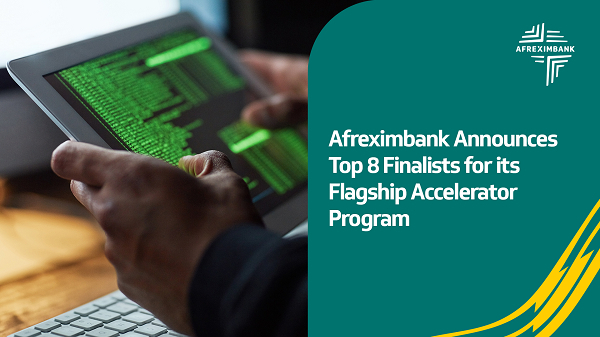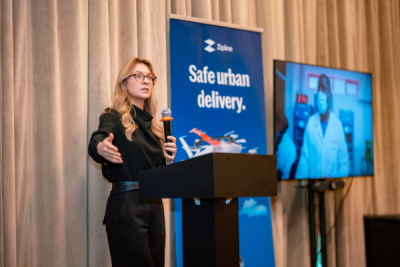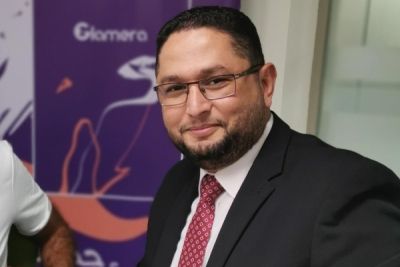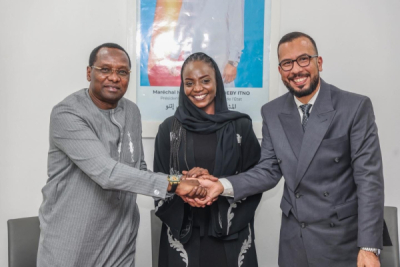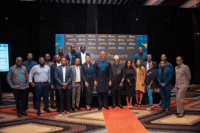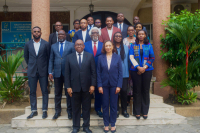Afreximbank has selected eight African startups for the inaugural edition of its acceleration programme, aimed at boosting innovation to support intra-African trade. The startups were chosen from more than 1,600 applicants and are based in countries including Nigeria, Egypt, Ethiopia and Côte d’Ivoire. Participants will take part in a three-month mentoring and training programme and will gain access to the bank’s network, as well as potential equity investment.
WhatsApp is testing a new feature that would allow users to share status updates exclusively with a “close friends” group, similar to Instagram’s functionality. Users would be able to create and name custom contact lists for this purpose, which could be reused without having to adjust privacy settings for each update. Status updates shared with this restricted group would be marked by a different-colored ring, indicating that the content is intended for a more private audience.
-
Addvocate uses artificial intelligence to improve sales productivity and decision-making.
-
The platform automates preparation, follow-up and CRM synchronization for sales teams.
-
Founder Ridha Mami brings a background in finance and international enterprise software sales.
Ridha Mami is a Tunisian technology entrepreneur with a background in finance. He serves as founder and chief executive officer of Addvocate, a platform that helps sales teams improve performance through artificial intelligence.
Founded in 2024, Addvocate provides AI-assisted conversations that help teams prepare for and conduct prospect interactions more effectively. The platform also delivers automation tools that reduce repetitive tasks. The system qualifies leads with precision to focus effort on high-potential opportunities and ensures seamless synchronization with existing customer relationship management tools.
Addvocate centralizes key information from sales tools, call reports and customer management systems. The platform delivers personalized summaries ahead of meetings, proposes relevant questions and suggests next steps. The system then supports the entire meeting lifecycle through recording, post-meeting summaries, customer follow-up and automated transitions between preparation and follow-up.
The platform also integrates Nudge, its flagship customer relationship management tool. The solution helps sales teams track deals and make informed decisions using real-time data. Nudge operates in full synergy with Addvocate. Together, the tools provide a clear view of sales performance and recommend concrete actions that support deal closure.
Ridha Mami earned a master’s degree in international finance in 2010 from the Institut des Hautes Études Commerciales de Carthage in Tunisia. He began his career the same year at Club Med, a French resort operator, where he worked as a key accounts manager.
In 2012, he joined Vocalcom in France, a cloud-based contact center software provider powered by artificial intelligence, as international sales manager. Four years later, he became strategic sales director at French software company Contentsquare. From 2022 to 2024, he worked at Wonderflow, a generative AI company specializing in voice-of-customer analytics, where he successively held roles as account executive, sales director for Europe and North America, and vice president of sales.
This article was initially published in French by Melchior Koba
Adapted in English by Ange J.A de BERRY QUENUM
-
Rwanda signed an expansion agreement with Zipline to build a national autonomous drone delivery network.
-
The deal includes Africa’s first urban drone delivery system and a new long-range distribution hub.
-
Zipline plans to establish its first international AI and robotics testing center in Rwanda.
Rwanda signed a strategic expansion agreement with Zipline on Thursday, February 6, to become the first country globally to operate a national autonomous drone delivery network, including Africa’s first urban drone delivery system. The agreement forms part of a $150 million grant awarded to Zipline by the U.S. Department of State, with Rwanda acting as the first beneficiary.
“The Rwanda-Zipline partnership has worked for years to deploy technology in service of our people. We have seen the extraordinary impact of drone delivery by saving time, saving money and saving lives. Through this partnership, we will now expand urban delivery and extend these benefits to even more communities,” said Paula Ingabire, Rwanda’s Minister of ICT and Innovation.
Rwanda will become the first African country to deploy Zipline’s urban delivery system, Platform 2. The technology enables fast, quiet and highly precise deliveries in dense urban environments such as Kigali, which accounts for nearly 40% of national healthcare demand. Zipline already operates the platform in the United States, where it delivers tens of thousands of retail and grocery items directly to homes and public locations.
The agreement also includes reinforcement of the existing delivery network through the opening of a third long-range distribution center in Karongi district, complementing the Muhanga and Kayonza hubs. This infrastructure will extend delivery coverage beyond the Nyungwe forest toward districts bordering the Democratic Republic of Congo, thereby improving territorial equity in access to essential medical products.
Beyond logistics, Zipline plans to establish its first international testing center dedicated to artificial intelligence and robotics in Rwanda. The research and development facility will test new safety systems, next-generation logistics software and aircraft performance under varied climate conditions. The center will also support local talent development and create highly skilled jobs in advanced technologies.
The new agreement builds on a long-term partnership between Rwanda and Zipline. The U.S. company has operated in Rwanda since 2016 and has renewed its partnership several times, including a $61 million contract signed in December 2022. That contract targets expanded delivery sites in rural and urban areas, with plans to triple volumes and reach nearly 2 million deliveries by 2029, covering more than 200 million kilometers flown by autonomous drones.
According to company data, the partnership has contributed to a 51% reduction in maternal mortality in covered areas. The real-time integration of delivery data into national health and emergency systems has also strengthened epidemiological surveillance and crisis response capacity.
This article was initially published in French by Samira Njoya
Adapted in English by Ange J.A de BERRY QUENUM
-
Glamera provides end-to-end digital management for beauty establishments of all sizes.
-
The platform integrates booking, payments, customer data and staff scheduling.
-
Founder Mohamed Hassan Hijazi brings a background in accounting and serial entrepreneurship.
Mohamed Hassan Hijazi is a trained accountant and an Egyptian serial entrepreneur. He serves as chief executive officer of Glamera, a digital platform for beauty professionals that he co-founded in 2019 with Omar Fathy and Zafer Al-Sheri.
Glamera delivers a specialized solution that manages all activities across the beauty sector. Small businesses and large chains both use the platform. The system adapts to each establishment by offering multiple plans that combine core services with additional features.
The platform provides a seamless flow from appointment booking to payment. The system aims to give businesses the tools to respond quickly to demand, organize schedules and track services without friction.
To simplify operations for professionals and customers, Glamera integrates multiple payment options. Users can manage online payments, deposits, and the issuance of receipts and invoices. The platform also enables the creation of promotional codes and gift cards to support sales campaigns and strengthen customer loyalty.
Glamera also focuses on leveraging customer data to support long-term relationships. The system stores relevant information that allows businesses to follow up with clients, encourage repeat visits and reinforce engagement. Beyond customer management, the platform supports daily team operations through a scheduling module that manages working hours, shifts, leave and breaks.
In 2009, Mohamed Hassan Hijazi co-founded Sibar Factory for Food Packaging, a company specializing in food packaging. He also co-founded Smart Zone in 2018, a venture studio that creates, incubates and scales technology-driven companies. In 2020, he contributed to the launch of EduraApp, an education platform that connects teachers and students.
Hijazi graduated from Suez Canal University in 2007 with a bachelor’s degree in accounting and business administration. He began his professional career in 2008 as an accountant at Sawary Al-Tameer for Construction, a construction company.
This article was initially published in French by Melchior Koba
Adapted in English by Ange J.A de BERRY QUENUM
-
Chad mandated Techso Group to secure and certify its national data center before launch.
-
Authorities linked the project to cybersecurity risks and the “Chad Connection 2030” strategy.
-
International rankings continue to place Chad among the weakest performers in cybersecurity and e-government.
Chadian authorities assigned Techso Group the task of securing the national data center ahead of its launch. A tripartite agreement was signed on February 5, between the company, the Agency for ICT Development (ADETIC) and the National Agency for Information Security and Electronic Certification (ANSICE).
The partnership covers a security audit and the certification of the site and its equipment to ensure compliance with current standards for critical infrastructure protection. “This aims to guarantee the reliability, integrity and resilience of the national data center,” said Nadjma Saleh Kebzabo, deputy director general of ANSICE.
The agreement also provides for the operational deployment of 100 micro data centers across government institutions. “Interconnected with the national data center, these systems will establish a unified, secure and high-performance digital architecture to support the dematerialization of administrative procedures and improve public service quality,” ADETIC said in a statement.
Authorities launched the initiative amid what they described as “growing challenges related to cybercrime and the protection of sensitive data.” Digital transformation continues to accelerate across Africa as governments integrate information and communication technologies to support socio-economic development. Chad, for example, places digital technology at the core of its national development plan known as “Chad Connection 2030.”
The plan includes $1.5 billion in digital investments. Authorities aim to position the country among Africa’s leading digital economies and significantly expand network coverage to connect most of the population. The program also targets the digitization and interconnection of all public and para-public services to provide full access to e-government services. Authorities also list digital inclusion among their priorities.
However, the International Telecommunication Union said cybersecurity remains a prerequisite for countries seeking to fully leverage ICT opportunities for development. The organization ranked Chad in the second-lowest category, Tier 4, in its 2024 Global Cybersecurity Index. Chad recorded relatively strong results in regulatory frameworks and cooperation but must intensify efforts in technical measures, organizational capacity and skills development.
For now, Chad ranks 189th out of 193 countries in the United Nations E-Government Development Index, with a score of 0.1785 out of 1. The country remains below the African average of 0.4247 and the global average of 0.6382.
This article was initially published in French by Isaac K. Kassouwi
Adapted in English by Ange J.A de BERRY QUENUM
-
Onafriq and PAPSS launched a pilot for local-currency payments from Nigeria to Ghana.
-
The partnership bypasses the dollar to reduce costs and speed up cross-border trade.
-
The initiative supports AfCFTA implementation and intra-African commerce growth.
On February 2, Onafriq Nigeria Payments, a fintech licensed by the Central Bank of Nigeria, announced a partnership with the Pan-African Payment and Settlement System. The partnership pilots a service that allows users to send money from a wallet or bank account in Nigeria to a beneficiary in Ghana. The initiative aims to facilitate payments between the two countries in local currencies without using the dollar in order to support intra-African trade under the African Continental Free Trade Area.
PAPSS, which AfCFTA authorities adopted as a reference platform for implementation, operates as a shared infrastructure that routes and settles payments between African banks, fintechs and mobile money operators. The platform offers an alternative to traditional correspondent banking networks, which often impose higher costs and longer settlement times for cross-border payments. By relying on this platform, Onafriq converts connected mobile wallets and bank accounts into access points to a pan-African real-time payment network.
Today, a small or medium-sized enterprise that imports from Ghana to Nigeria or exports in the opposite direction typically uses international banking channels. These channels impose multiple layers of fees, processing delays that stretch over several days, and near-systematic conversion through the dollar or the euro. These constraints weigh more heavily on small firms, which face limited capacity to absorb foreign exchange costs and payment delays.
The Onafriq–PAPSS pilot offers near-instant local-currency payments between Nigeria and Ghana through familiar wallet and banking application interfaces. Mxolisi Msutwana, managing director for Anglophone West Africa at Onafriq, said: “This is how we open bidirectional trade corridors, reduce costs for businesses and empower African enterprises to trade confidently in their own currency. The vision is continental, but it starts with concrete actions like this.”
Ositadimma Ugwu, chief information officer at PAPSS, added: “With this move, we challenge this mindset by enabling Nigerians to send money to their neighbors as easily as they send a text message.”
A Key Component of AfCFTA Implementation
According to Afreximbank’s Africa Trade Report 2025, intra-African trade reached $220.3 billion in 2024, representing a 12.4% increase from 2023. The figure remains below the estimated potential of $296.3 billion. The report states that AfCFTA can help close this gap if countries also strengthen financial infrastructure. In this context, solutions such as PAPSS, combined with private mass-payment networks, represent practical tools to convert trade agreements into real transactions and support AfCFTA implementation.
“The Pan-African Payment and Settlement System reduces dependence on foreign currencies and improves the efficiency of intra-African trade, while national digital payment ecosystems expand rapidly and generate billions of dollars in annual revenues,” Afreximbank said in the report.
This article was initially published in French by Melchior Koba
Adapted in English by Ange J.A de BERRY QUENUM
-
Ivory Coast plans to regulate and organize digital content monetization by 2026.
-
The government opened talks with regulators and industry partners to define revenue-sharing mechanisms.
-
Streaming growth highlights rising economic stakes but exposes persistent income gaps for artists.
The Ivorian government announced its intention to make digital content monetization effective by 2026 in response to demands from cultural, music and media stakeholders. Culture and Francophonie Minister Françoise Remarck opened discussions on February 2, with the High Authority for Audiovisual Communication (HACA) and several sector partners to define mechanisms to valorize locally produced digital content.
The initiative seeks to establish a regulatory and operational framework to capture and redistribute a significant share of revenues generated from online listening, music streaming, video and audiovisual content. The executive branch aims to structure an ecosystem in which local and international digital platforms compensate artists and creators under clear rules while authorities strengthen copyright regulation and distribution contracts.
The issue carries growing economic weight. The International Federation of the Phonographic Industry said in its Global Music Report 2025 that sub-Saharan Africa recorded a 22.6% increase in recorded music revenues in 2024, reaching a record $110 million, or nearly five times the global growth rate of 4.8% over the same period.
In Ivory Coast, music streaming platforms such as Boomplay, Spotify, Apple Music and Deezer continue to expand their user bases. Compensation models vary across platforms and markets. By way of indication, one million streams on Spotify can generate about CFA1.2 million, or roughly $2,155, for rights holders, highlighting both the economic potential of streaming and persistent revenue disparities.
Despite expanding digital audiences, monetization remains limited for many artists in Francophone Africa. Contract structures and regulatory frameworks continue to allow a significant share of value creation to escape local creators.
The Ivorian initiative also aligns with a broader push to develop the national digital economy. The country benefits from relatively solid mobile infrastructure. Fourth-generation network coverage reached 76.88% in the first quarter of 2025, improving access to digital services and content distribution platforms.
By structuring digital content monetization, Abidjan aims to integrate the creative economy more fully into the formal sector, strengthen revenues for local artists and producers, and position digital culture as a driver of economic growth and employment as streaming and digital content markets continue to expand across Africa.
This article was initially published in French by Samira Njoya
Adapted in English by Ange J.A de BERRY QUENUM
-
Kenya launched a private outsourcing coalition targeting 100,000 digital jobs by 2026.
-
Four major operators founded the alliance with government backing.
-
The government linked outsourcing growth to youth employment and training programs.
Kenya targets business process outsourcing to create digital jobs and attract investors as it seeks to position itself as a regional hub for corporate services.
The country faces persistent youth underemployment. In response, policymakers now promote outsourced digital services as a growth engine for employment and foreign investment.
Four major business services operators launched this week the Outsourcing Alliance of Kenya (OAK) in an unprecedented private-sector initiative.
The coalition aims to structure and accelerate the development of Global Business Services, including business process outsourcing and outsourced IT services. The Ministry of Information, Communications and the Digital Economy announced the launch on its X account on Thursday, February 5, marking a new phase for a sector expected to play a central role in job creation.
The Outsourcing Alliance of Kenya officially launched on February 3, 2026, according to a statement published by the ministry.
𝐊𝐞𝐧𝐲𝐚'𝐬 𝐆𝐥𝐨𝐛𝐚𝐥 𝐁𝐮𝐬𝐢𝐧𝐞𝐬𝐬 𝐒𝐞𝐫𝐯𝐢𝐜𝐞𝐬 𝐒𝐞𝐜𝐭𝐨𝐫 𝐑𝐞𝐚𝐜𝐡𝐞𝐬 𝐍𝐞𝐰 𝐌𝐢𝐥𝐞𝐬𝐭𝐨𝐧𝐞𝐬 𝐰𝐢𝐭𝐡 𝐋𝐚𝐮𝐧𝐜𝐡 𝐨𝐟 𝐎𝐮𝐭𝐬𝐨𝐮𝐫𝐜𝐢𝐧𝐠 𝐀𝐥𝐥𝐢𝐚𝐧𝐜𝐞
The Outsourcing Alliance of Kenya (OAK) was officially launched on February 3, 2026, signaling… pic.twitter.com/NjaNNt3g7M
— Ministry of Info, Comms & The Digital Economy KE (@MoICTKenya) February 5, 2026
Government representatives attended the event. Kenyan Wall Street reported that the alliance brings together CCI Kenya, CloudFactory Kenya, Teleperformance Kenya and Sama Kenya. The coalition plans to expand to more than 20 members by the second quarter of 2026 and aims to help create 100,000 jobs across the value chain.
John Tanui, Principal Secretary for ICT and the Digital Economy, said in a speech read at the event that Global Business Services expansion provides inclusive opportunities for young people.
He said the government supports the sector through targeted policies, adapted regulatory frameworks and measures that facilitate access to international markets. He added that the state relies on training programs such as Ajira Digital and Jitume, which aim to equip Kenyan youth with skills demanded by the global outsourcing market, according to the Ministry of the Digital Economy.
This initiative comes as Kenya records an unemployment rate of about 5.2% in 2025, with youth facing particularly difficult labor market conditions.
At the same time, internet penetration reaches 48% in 2025. The rate remains below advanced-market levels, but steady growth strengthens the foundation for digital services and outsourcing development.
This article was initially published in French by Félicien Houindo Lokossou
Adapted in English by Ange J.A de BERRY QUENUM
Google has opened applications for the 10th cohort of its Google for Startups Accelerator Africa, now focused specifically on artificial intelligence. The 12-week hybrid program targets Series A startups based in Africa or developing solutions for the continent. Selected founders will receive equity-free support, Google Cloud credits, mentorship from AI experts and exclusive access to investors. Applications are open until Wednesday, March 18.
More...
From April 7-9, 2026, Morocco will host GITEX AFRICA, the continent’s premier summit on technology, startups and digital policy. Centered on the theme “AI for Inclusive Transformation,” the event will bring together government officials, investors and tech leaders to examine key pillars of the digital economy, including connectivity, cybersecurity, smart cities and the rapid rise of African fintech.
Redtech, backed by Heirs Holdings, processed $20.6 billion (29 trillion naira) in transactions in 2025, doubling its volume from a year earlier. Its RedPay platform spans POS terminals, merchant acquiring and digital channels, helping the company solidify its position as a key national infrastructure provider. Redtech is now targeting expansion into nearly 30 African countries by 2027.
-
Mourana Soumah takes charge of Guinea’s Ministry of Communication, Digital Economy, and Innovation, merging information, telecom, and digital portfolios.
-
He brings extensive finance experience, having modernized state treasury operations and represented Guinea at the IMF, World Bank, and AfDB.
-
Key priorities include expanding connectivity to over 600 unserved areas, strengthening cybersecurity, and promoting digital innovation in public services and education.
Guinea appointed Mourana Soumah as Minister of Communication, Digital Economy, and Innovation on February 2, President Mamadi Doumbouya’s office announced. The new ministry merges the former Ministry of Information and Communication, previously led by Fana Soumah, with the Ministry of Posts, Telecommunications, and Digital Economy, formerly overseen by Rose Pola Pricemou.
Soumah holds a degree in economics from Université Gamal Abdel Nasser de Conakry, a master’s in economic policy management from CERDI-Université d’Auvergne, France, and a diploma from the ENA Paris-Strasbourg in public finance. He also completed specialized training at the IMF, French Ministry of Finance (Bercy), BCEAO, and institutions in Canada and Morocco.
He served as Minister of Economy and Finance from March 2024, implementing reforms to modernize state financial management, strengthen public treasury operations, and enhance budget credibility. He represented Guinea at the IMF, World Bank, and African Development Bank, and chaired strategic national committees including the Simandou Strategic Committee and the C2D Steering Committee.
Prior to government service, Soumah led the General Directorate of the Treasury and Public Accounting (2021–2024) and the Central Accounting Agency of Treasury Deposits. He contributed to reforms such as the implementation of the Single Treasury Account (CUT), the Integrated State Accounting System (SCIE), and the national payments system.
In his new role, Soumah will focus on modernizing public communication, accelerating digital transformation across government, strengthening national digital sovereignty, and promoting innovation as a driver of economic growth, transparency, and inclusion. Officials plan to expand connectivity to more than 600 unserved areas, develop digital services in education and public administration, and reinforce cybersecurity and local data hosting.
Guinea had 14.2 million mobile connections in 2025, covering roughly 95% of the population, while Internet penetration reached 26.5%, or about four million users, according to DataReportal. Mobile Internet subscriptions have surged nearly 97.4% in recent years, reflecting rapid adoption of digital services and emphasizing the urgency of the government’s digital agenda.
This article was initially published in French by Samira Njoya
Adapted in English by Ange J.A de BERRY QUENUM
-
Burkina Faso connected 370 localities to telecom networks in 2025, expanding Internet and phone access.
-
The government achieved 91% of its 2025 digital objectives, including 272 online public service platforms.
-
Authorities plan to enroll 7 million citizens in a unique electronic ID system and cover 750 additional localities in 2026.
Burkina Faso reported significant progress in implementing its 2025 digital development objectives. The Ministry of Digital Transition, Posts, and Electronic Communications achieved a 91% completion rate, the government said during a review session chaired by Prime Minister Rimtalba Jean Emmanuel Ouédraogo on February 3.
The ministry described 2025 as a “pivotal year” for digital transition. It connected 370 new localities to telecom networks, giving residents their first access to phone and Internet services, and reducing the digital divide.
Authorities also accelerated public administration modernization. They developed or deployed 272 online service platforms, with 146 already operational, facilitating citizen and business access to government services. In addition, the government and La Poste signed an agreement to build 20 “Zama Tchéy” citizen centers, targeting vulnerable populations to improve digital inclusion.
For 2026, the ministry plans to build on these gains. It will implement a unique electronic identification system, aiming to enroll seven million people by year-end. Officials also plan to extend telecom coverage to 750 additional localities, establish a dedicated government network, and develop national messaging and collaboration tools.
The ministry inaugurated a digital infrastructure supervision center in January 2026 to strengthen cybersecurity and manage critical systems. It allocated 61 billion CFA francs (about $109.7 million) to implement these initiatives.
Despite progress, Burkina Faso faces structural challenges. Internet penetration remains low at 22.4%, with 5.42 million users at the end of 2025, according to DataReportal. Mobile connections totaled 29.3 million, or 121% of the population, indicating room to expand digital services.
This article was initially published in French by Samira Njoya
Adapted in English by Ange J.A de BERRY QUENUM


